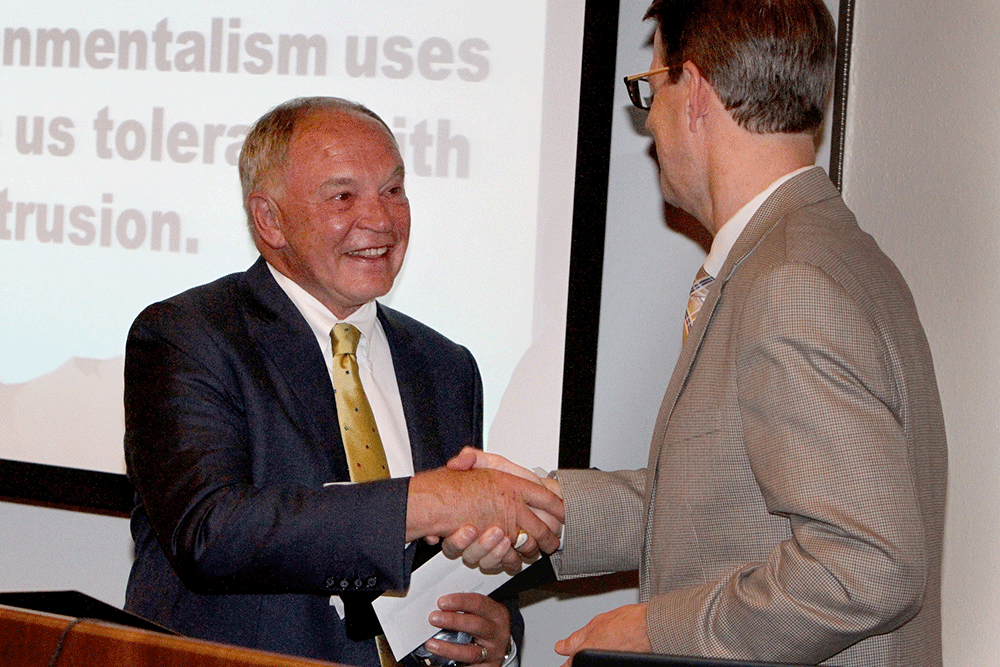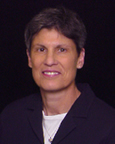On Friday, October 23rd, Kathy Ratté shared the following remarks as she presented Terry Anderson with the Gary Walton Award for Leadership in Economic Education.
Last spring my husband and I were discussing some immediately forgettable but predictably dismal manifestation of what F.A. Hayek famously called the “fatal conceit” when he charged economists with “demonstrating to men how little they really know about what they imagine they can design. “
I don’t remember exactly what it was; the list of “ways to manage other people’s lives because we know best” is endless. From bans on playground tag, to zero tolerance for tolerance, to proscriptions against offensive speech, and prescriptions for which light bulbs we should use.
Whatever it was had my husband depressed. He wondered to me whether things would ever get better, meaning would the tide ever turn from disempowerment to a resurgence of belief in the competence, dignity, and resilience of ordinary people?
My normal response is to say something soothing – I mean, we’ve been married for 35 years; I’ve heard it all before and he knows that I basically agree with him – but this time, I disagreed, asserting that ideas still matter, and that people who fight for them do change the world.
My evidence? I had just finished reading Free Market Environmentalism for the Next Generation, an uplifting testimony to the accomplishments of its author, tonight’s honoree, Terry Anderson.
The Gary Walton Award for Leadership in Economic Education is presented to an individual who has:
- advanced the understanding and application of economics and the economic way of thinking;
- shown exemplary dedication to improving economic education and the teaching of economics; and
- through teaching, writing, curriculum development, research, or support has inspired students, teachers or the general public to appreciate how the economic way of thinking strengthens and informs leadership.
We put “or” in the list of qualifications, wanting to encourage and allow the selection committee to cast a wide net. For this inaugural presentation, however, we can change all the “ors” to “ands” because our honoree meets them all.
The story of his accomplishments should be a source of hope and renewed conviction for all who believe in competence and creativity of individuals living in a free society.
Terry Lee Anderson is one of the 1980 founders of PERC, the Property and Environment Research Center, in Bozeman, MT. Until recently, he served as the Executive Director, and has now “retired” as the William A. Dunn Distinguished Senior Fellow, leaving leadership to Reed Watson, an extremely talented protégé whom Terry continues to mentor – whether Reed wants him to or not.
Terry is also the John and Jean DeNault Senior Fellow at the Hoover Institution at Stanford University. He is the author of 38 books, including the Free Market Environmentalism series that shores up my optimism about emergent order and human flourishing. He is published widely in professional journals and the popular press, including frequent editorials in the Wall Street Journal, and is a welcomed guest on radio and television programs dealing with environmental issues. In addition to a 25-year teaching career at Montana State University, Terry has been a visiting scholar at Oxford University, Basel University, Clemson University, Cornell University, and the University of Canterbury, and has won the Liberal Institute of Prague’s annual award for ideas promoting freedom and prosperity.
I could go on, but you get the picture: the man’s got cred. If the measure of a man is the list on his C.V., then Terry’s a lot taller than he looks. But that’s not why we choose him, and why we choose him is the story I want to tell you.
The story as I know it – and I’m sure there are parts of it that I don’t know and don’t want to know – begins after Terry received his undergraduate degree from the University of Montana in 1968 and began graduate work at the University of Washington under the guidance of Douglass North, who would go on to win the 1993 Nobel Prize in Economic Science.
Terry was a talented student and Doug an exacting mentor, so the day came when Terry had to decide which prestigious academic institution’s offer to accept, and tell Doug.
As Terry tells it, he spent a sleepless night, relatively certain that Dr. North would not be overjoyed by his choice—which was to turn his back on the bright lights of big academia and return to his home state to teach at little ol’ Montana State University.
Terry’s nervousness wasn’t misplaced. No one is sure what the exact words were because the volume of the roar battered not just Terry, but the administrative assistants in the outer foyer. The gist was that Doug thought Terry was flushing a promising career down the toilet and had, quite simply, lost his mind. (After many years, Terry and Doug were again on speaking terms, but I think it’s important to note that the “Terry as moron” theme is recurring. Stay tuned.)
PERC was created in 1980 by a handful of economists who began by asking the question, “If markets can produce bread and cars, why can’t they produce environmental quality?” Since its founding, PERC has moved from being a voice in the wilderness to holding a prominent place on the environmental policy stage.
The emergence of PERC is a story of the triumph of education. In addition to producing and fostering ongoing research, PERC holds seminars for (often hostile) journalists and congressional staffers, runs programs that encourage students and entrepreneurs, and publishes both online and in print to highlight examples of market institutions producing and enhancing environmental quality, challenging the prevailing idea that environmental problems are the result of market failure and are too big for anything but the federal government to deal with.
Back to the story. In 1991, Terry and PERC colleague Don Leal published Free Market Environmentalism, introducing the term—and the acronym FME—that are now widely used to denote the principle and practice of using markets and property rights to protect and improve environmental quality.
I liked the book; it had lots of great stories and there’s something uplifting about people who succeed when everyone expects them to fail. And, Terry and I were working together in FTE programs, so I had to say it was good. I was right, of course, but some of the reviewers, disagreed. Channeling Doug North’s concern, one wrote “Free Market Environmentalism is an oxymoron, and Anderson and Leal are the morons.”
See – I told you the theme recurs.
The initial publication of Free Market Environmentalism in 1991, the revised edition in 2001, and the publication earlier this year of Free Market Environmentalism for the Next Generation, chronicle the transformation of FME from a controversial, out-there, collection of stories to a respected body of research and theory, and to an accepted and increasingly mainstream approach to environmental issues and policy.
PERCies, as they’re called, like to talk about “environmentalism that works.” I think the story of FME is also a story of education that works.
One of the ways we know that education has happened is through language. Thirty years ago, no one had heard the term “free market environmentalism or FME.” Today not only is the term recognized and used, but the approach it advocates is increasingly accepted throughout the environmental community and even (gasp!) the media.
Terry and PERC are also responsible for adding the term, enviropreneur to the language of environmentalism, to designate entrepreneurs who “do well by doing good,” using markets and market forces to provide or enhance environmental quality. PERC’s annual Enviropreneur Institute trains and encourages the growing legion of young environmental entrepreneurs all over the United States and around the world.
To balance out his creation of new vocabulary, Terry is also leading a hard-charging campaign to eliminate a word from our language. The e-word — “externality” — Terry argues, isn’t a thing. It’s instead the absence of a thing – the absence of the clearly defined and enforced property rights that create the rules of the game in which enviropreneurs flourish and the demand for environmental amenities is met by individuals acting in a society that grants them both liberty and responsibility.
The jury’s still out on whether Terry’s campaign against the e-word will be successful, but that doesn’t diminish the magnitude of his and PERC’s achievement.
Free Market Environmentalism has gone from an oxymoron to a sign post for the next generation – testimony to a career of fostering economic education and the economic way of thinking.
As David Morris, of the Institution for Local Self-Reliance, commented, today, “free market environmentalists are pushing against an open door.” That door is open because Terry Anderson stuck his foot in it. His work is an affirmation of the power of the educator, whether in the classroom, the congressional hearing, the media, or just telling stories in everyday conversation.
Reading Free Market Environmentalism for the Next Generation last spring, I realized that I had watched that door open over the past 30 years and hadn’t even noticed it happening. That it did is, for me, a source of optimism and inspiration. I hope it is for you.
And now, it is my privilege and pleasure to introduce Terry Anderson, the 2015 recipient of the Gary Walton Award for Leadership in Economic Education.
Kathy Ratté is the Director of Curriculum Development for the Foundation for Teaching Economics. Their most recent classroom guide, inspired by Cecil the lion, explores the issue of Big Game Hunting.




